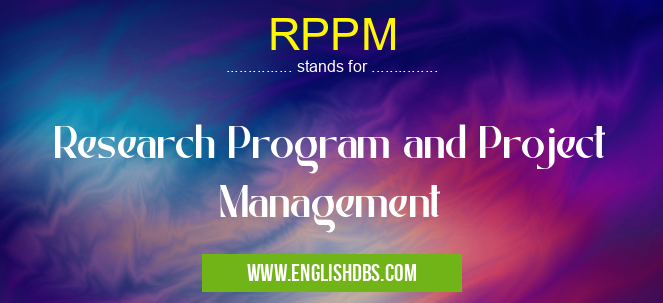What does RPPM mean in MANAGEMENT
RPPM stands for Research Program and Project Management. It is a key part of the management process in businesses and organizations, as it provides the ability to coordinate and manage projects that help develop a successful product or service. RPPM utilizes an array of practices, tools, and techniques which enables the project team to achieve success in executing their tasks on time. This post will discuss what exactly RPPM involves, why it is important for businesses, as well as how to develop an effective RPPM strategy.

RPPM meaning in Management in Business
RPPM mostly used in an acronym Management in Category Business that means Research Program and Project Management
Shorthand: RPPM,
Full Form: Research Program and Project Management
For more information of "Research Program and Project Management", see the section below.
» Business » Management
Developing an Effective RPPM Strategy
When developing an effective RPPM strategy there are several key steps that should be taken to ensure optimal results. First off it is essential to identify the scope of the project along with its short-term and long-term objectives before beginning implementation. Additionally target milestones should be set with clear deadlines outlined for each task so that all relevant stakeholders understand what needs to be accomplished by when. Risk management protocols must also be established prior to launch so potential problems may be identified before they arise as well as mitigation strategies implemented as necessary throughout the life cycle of the project.
Essential Questions and Answers on Research Program and Project Management in "BUSINESS»MANAGEMENT"
What is Research Program and Project Management (RPPM)?
RPPM is the process of managing a research program or project from beginning to end. It covers all aspects of planning, monitoring, and controlling activities related to the research initiative in order to achieve desired outcomes. RPPM helps ensure that research initiatives are completed on time and within budget while achieving their intended objectives.
How can RPPM help manage a research program or project?
RPPM offers a comprehensive approach for managing research efforts, helping ensure that progress is tracked, risks are identified and evaluated, resources are used efficiently, stakeholders remain informed, appropriate measures are taken to manage quality and cost control, and desired outcomes are achieved in a timely manner.
Who typically uses RPPM?
Organizations involved with research initiatives such as universities, think tanks, non-governmental organizations, government departments or agencies typically use RPPM to ensure effective and efficient management of their programs.
What kind of tasks does an RPPM practitioner usually do?
A practitioner may be responsible for developing a plan for the project or program; defining roles and responsibilities; monitoring progress towards key milestones; risk management; keeping stakeholders informed; preparing reports; making modifications as needed throughout the life cycle of the project or program; evaluating outcomes at completion; assessing lessons learned, etc.
What skills must an RPPM practitioner have in order to be successful?
A successful practitioner should possess strong organizational skills and knowledge of relevant principles and techniques associated with project/program management disciplines such as budgeting, scheduling, resourcing strategies etc.; excellent communication skills necessary for collaboration among various stakeholders involved in the process; problem solving capabilities along with analytical thinking skills able to identify potential risks/opportunities which may impact the progress of the initiative; ability to make sound decisions based on facts available at hand.
How does one become an RPPM practitioner?
Generally speaking individuals need to acquire experience in either program/project management practices or research design field prior starting out as a practitioner of increasing their knowledge base through postgraduate studies with relevant credentials such as PMP® certification from Project Management Institute (PMI). Gaining hands-on experience by working on real world projects can prove invaluable when it comes to applying these newly obtained technical/theoretical skills in practice.
What tools do practitioners use when implementing RPPM?
Practitioners utilize various tools ranging from traditional paper-based approaches such as spreadsheets up until more advanced digital ones like project management software products (e.g., MS Project) which enable practitioners keep track of both time & resources required for completing each task included within overall plan while minimizing risk factors associated with any given initiative. Furthermore they facilitate communication between team members & stakeholders parties involved throughout execution stage thus helping maintain focused around previously established deliverables/outcomes aimed by particular endeavor in question.
Is there ever any additional training required even after becoming certified?
Continuous learning process is essential for keeping up with ever changing environment we are present within nowadays - same applies when it comes down setting off into journey toward becoming proficient practitioner capable delivering highest value possible through implementation phase when it comes down employing various methods associated within this area expertise alike - vast array related topics can be gain mastery over depending upon personal chosen specialization field (e.g., IT systems integration) so individual's best bet would be staying informed pertaining latest trends developments occurring across industry landscape.
How long does it take to develop competency as an RPPM Practitioner?
Highly depends upon individual's current level skill set but generally speaking gaining mastery over specific topics associated within domain requires dedicated amount time + effort order attain required level competence enabling them carry out successfully tasks defined particular standard(s). Depending upon depth complexity particular endeavor its likely take couple months minimum reach point where one could call themselves proficient enough perform job without major mistakes being made across board.
